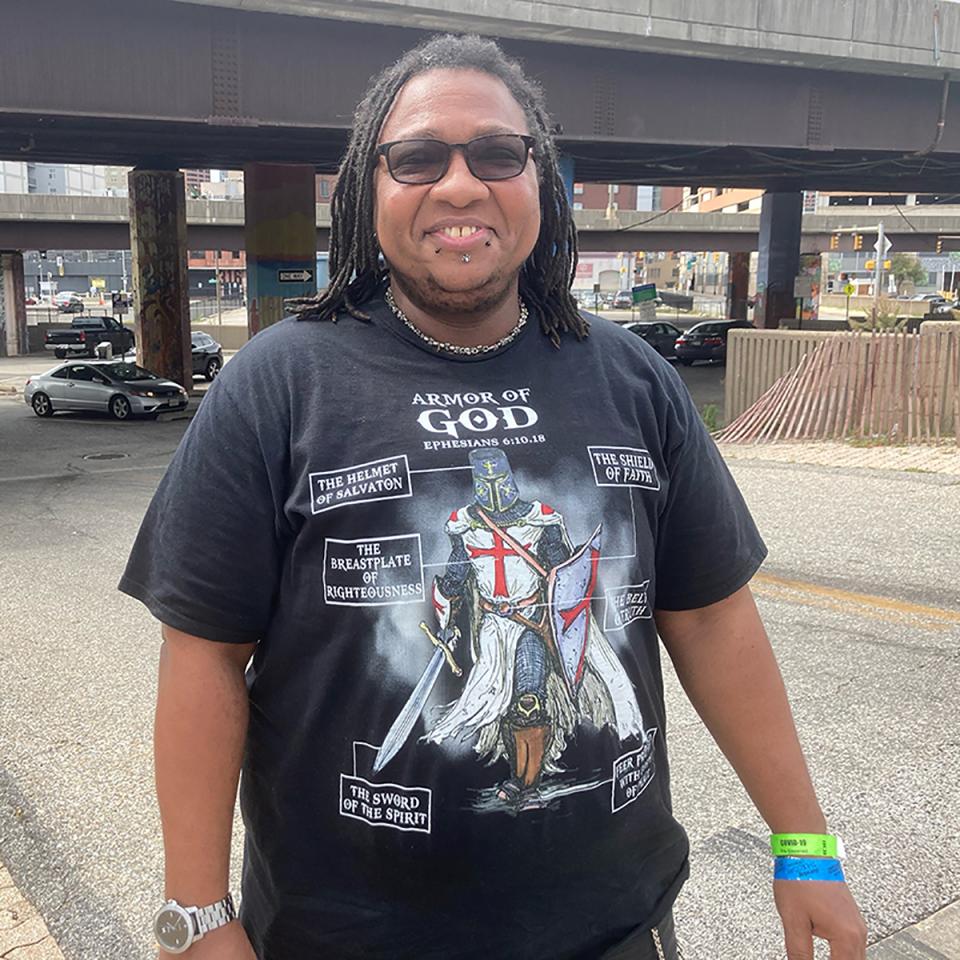An artist, gamer, and movie lover, Curtis McLaughlin (above) has been part of the Health Care for the Homeless Art Group for more than five years.
Art is one of my coping skills. I can be anywhere and create art wherever I go.


10.27.21
Von Cash has a movie reference for every occasion, wise words from his discipleship program and a homemade remedy for everything. He's never been happier. But, he had to wait 48 years to get there.
“When I was little, I asked my mom why I didn’t look like my brother. She told me, ‘you are a girl,’ says Von. “I never saw that pretty girl, but there was always someone to shut me down.”
Like many members of the transgender and gender non-conforming (TGNC) community, this reinforced shame kept Von from living fully as himself up until two years ago.
“In this country, we are raised to hate ourselves already, especially Black people. The system wants to keep us low so it can use us and I’m starting to understand that more. It never occurred to me not to be afraid until now,” he says.
Seven years after first walking through our doors for insurance, medication and therapy, Von told his therapist that he wanted to start his medical transition from female to male. He connected with Lead Medical Provider Tyler Cornell, CRNP and started hormone replacement therapy (HRT) six months later.
“Providing HRT shouldn’t be the gold standard of care, it should just be the standard,” says Tyler. However, this is hardly the case. In Tyler’s experience, gender-affirming care is learned on the job and taught by clients, instead of in standard medical training.
Shelters that welcome TGNC people are also far from the standard. Von has lived in a women’s housing program for five years. Now that he is more open about his identity, he’s unsure if his housing is secure and what alternatives he may have. TGNC youth who still rely on parents/caregivers for support can be at even higher risk of experiencing homelessness because families often reject or abuse them. And there aren’t many places for them to turn.
Baltimore Safe Haven, an organization founded and run by Black trans women, is the only program in our city that offers shelter specifically for TGNC people. Most shelters do not acknowledge or respect the rights of TGNC people and are incredibly unsafe for them. This means they often sleep on the streets and are very likely to be targets of violence (see statistics).
Creating safe spaces for TGNC people in a world that offers them almost none is both life changing and life-saving.
“At my lowest, when I was using and in a shelter, I didn’t want to be alive anymore. But between finding God and transitioning, I just feel so free,” Von says with a sigh of relief.
That freedom has allowed him to invest time in strengthening his relationship with himself, his three kids and God.
“I haven’t always been the best parent, especially when I was low. My kids might not understand my transition, but I know how I feel. And, I’m finding that once you love yourself, it’s easier to love others,” he says.
Now 50, Von is looking to the next 50 years of his life with determination to finish his discipleship program, open a health and wellness business, “plant good seeds,” everywhere he goes and maybe even fall in love.
“I’ve never been this confident before—I feel like Superman,” Von says with a huge smile on his face.
Learn more about:
Transgender Day of Remembrance I How to create safe space for TGNC community members
An artist, gamer, and movie lover, Curtis McLaughlin (above) has been part of the Health Care for the Homeless Art Group for more than five years.
Art is one of my coping skills. I can be anywhere and create art wherever I go.
Client storytelling is a staple of the nonprofit business model, ever present in advocacy, clinic tours, fundraising—and news articles like the one you are reading right now.
The Trans Rights Advocacy Coalition (TRAC) has been the driving force in championing trans rights policy changes in Maryland. Due to stigma and structural discrimination, transgender people—particularly transgender people of color—experience high rates of homelessness. Following the implementation of the Trans Health Equity Act in January, we talked with TRAC leadership about their work and community.
Since starting in January 2022, REI Health Specialist Arie Hayre-Somuah, LMSW, MPH has worked with our clinical teams to identify health disparities and move us closer to health equity. This year, she is turning her focus to the topic of health literacy.